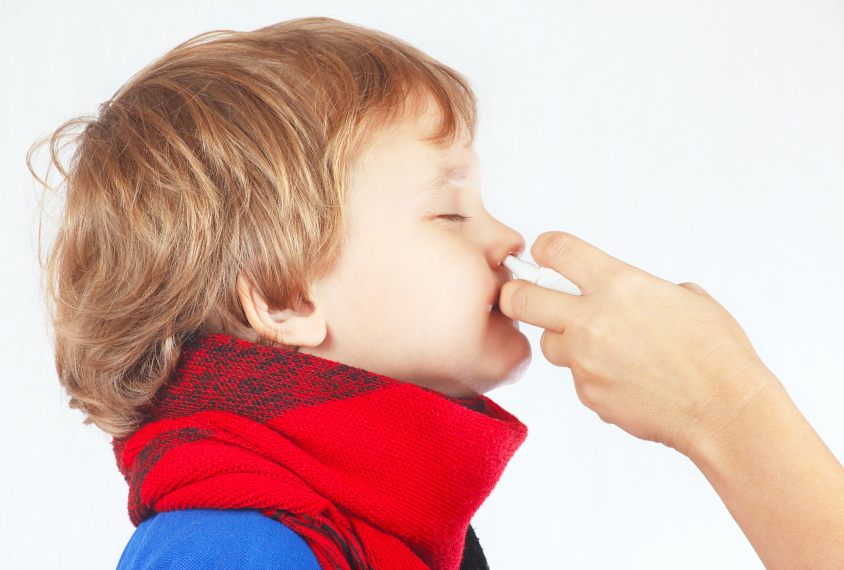
Boris Bulychev /Shutterstock.com
THIS ARTICLE IS MORE THAN FIVE YEARS OLD
This article is more than five years old. Autism research — and science in general — is constantly evolving, so older articles may contain information or theories that have been reevaluated since their original publication date.
Inhaling puffs of the hormone oxytocin modestly improves social skills, the first trial of the hormone in children with autism has found. The findings, published 27 October in Molecular Psychiatry, add to mounting evidence that oxytocin may ease a core feature of autism in some people with the disorder1.
Oxytocin is known to play a role in a range of social skills, including empathy and trust. Spritzes of a nasal spray containing the hormone have been reported to boost social skills, such as the ability to maintain eye contact, and enhance brain responses to facial expressions in some older children and adults with autism. The new study is the first to extend oxytocin’s potential benefits to young children with the condition.
“We know that early intervention is really important in autism,” says lead investigator Adam Guastella, clinical psychologist at the University of Sydney in Australia. “It’s a lot harder to change circuits that are entrenched.”
Although oxytocin’s effects on the children’s social skills are modest, it has no serious side effects, the researchers found. “If you have a safe treatment, you’re more likely to intervene at an early stage of development,” says Eric Hollander, director of the Autism and Obsessive Compulsive Spectrum Program at Albert Einstein College of Medicine in New York, who was not involved in the study. “And if you can intervene at an early stage of development, then you’re more likely to have a meaningful impact on the long-term trajectory of the illness.”
Sniff test:
In the new study, Guastella and his colleagues randomly assigned 31 children with autism, aged 3 to 8 years, to inhale either a nasal spray containing oxytocin or a placebo mist twice a day for five weeks. Each group of children then received no spray for four weeks before switching to the other group for five more weeks. The break between the two phases of the trial minimized the chances that the effects of oxytocin or placebo would carry over to the second phase.
Parents rated their child’s social skills and repetitive behaviors before and after each phase of the 14-week study. Trained clinicians also assessed the children. None of the clinicians, participants or caregivers were aware of which group each child was in.
At the end of the study’s first phase, the children who had received oxytocin showed slight improvements in social behavior, based on parent ratings, but no better than the placebo. However, parents of children who took oxytocin during the last five weeks reported greater improvements than did those of children taking a placebo.
Overall, clinicians noted improvements in social behavior in 72 percent of children taking oxytocin compared with 41 percent of those getting the placebo.
In contrast to results from previous studies, the new study did not show any effect of oxytocin on repetitive behaviors.
Strong placebo:
It’s not clear why oxytocin’s benefits emerged only in the second phase of the study. Guastella says a strong placebo effect, known to plague clinical trials of autism therapies, may have skewed parent ratings of child behavior in the first phase of the study but faded by the second phase.
“The second phase of treatment is providing a more sensitive period to assess the real effects,” Guastella says. “Possibly, we’ve washed out some of the placebo effects and other things that influence response biases in clinical trials.”
The improvements in social behavior are modest, and on their own may not make a difference in a child’s quality of life, notes Larry Young, director of the Silvio O. Conte Center for Oxytocin and Social Cognition at Emory University in Atlanta, who was not involved in the study.
Still, he says, the findings are encouraging because the drug seems to be safe. Some parents reported that their child showed increased thirst, urination and constipation while taking oxytocin, but the placebo group also reported these symptoms.
“There are no other drug therapies with fewer side effects that can produce even modest improvements,” Young says. “We should now begin to see if such a therapy might produce more robust effects if combined with other behavioral-based therapies.”
By joining the discussion, you agree to our privacy policy.